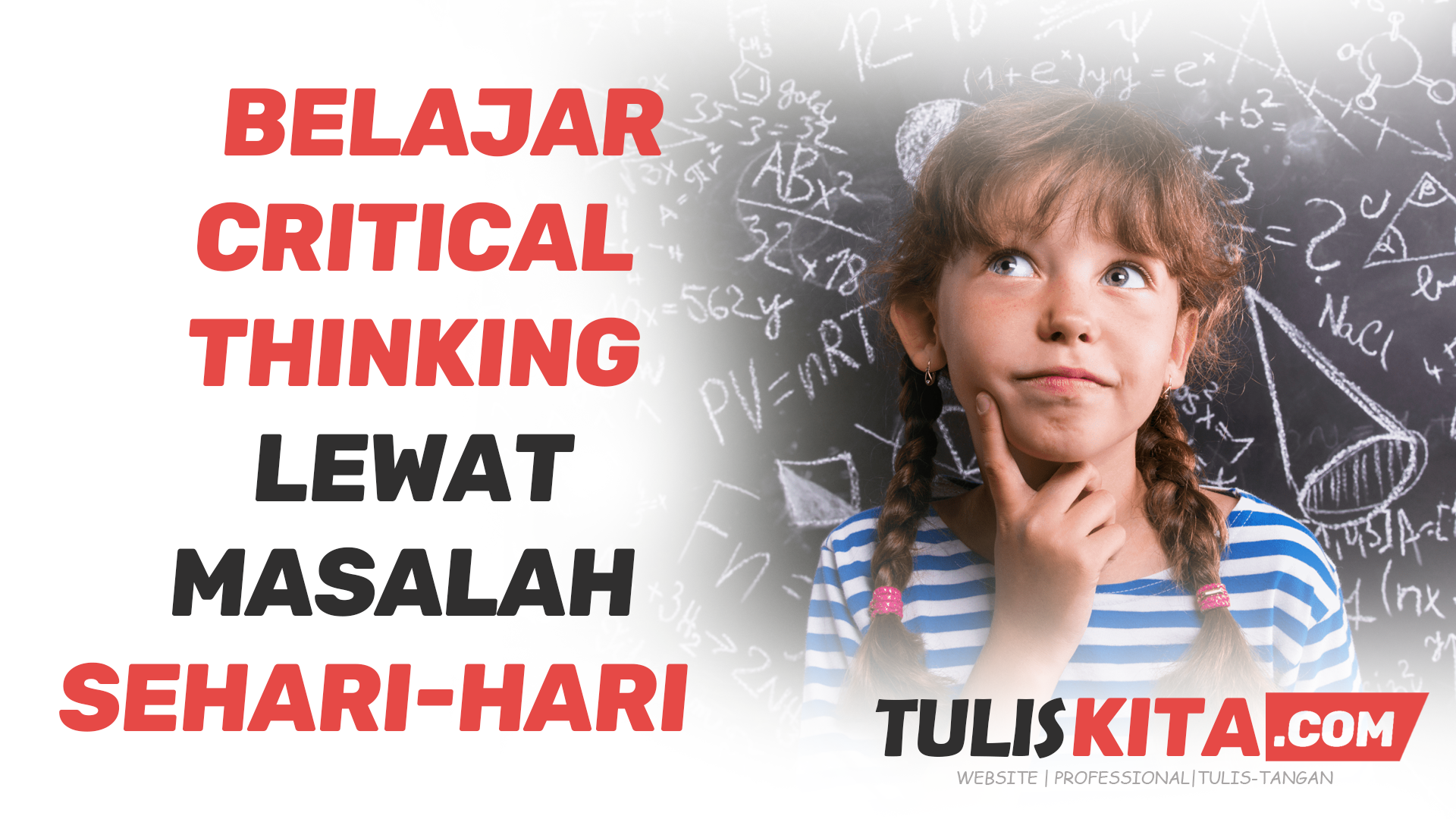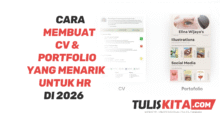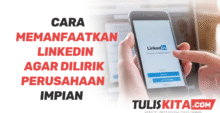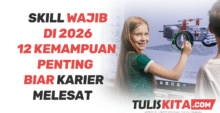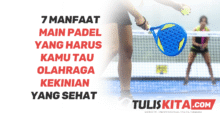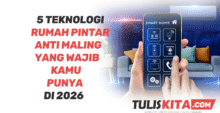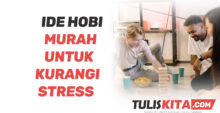TULISKITA.COM – Belajar critical thinking lewat masalah sehari-hari merupakan pendekatan praktis yang paling efektif untuk mengembangkan kemampuan berpikir kritis tanpa harus mengikuti kursus formal atau membaca buku teori yang rumit. Kehidupan sehari-hari penuh dengan situasi yang membutuhkan analisis, evaluasi, dan pengambilan keputusan yang bijak, menjadikannya laboratorium alami untuk mengasah kemampuan berpikir kritis.
Critical thinking atau berpikir kritis adalah kemampuan untuk menganalisis informasi secara objektif, mengevaluasi argumen berdasarkan bukti, dan membuat keputusan yang rasional tanpa terpengaruh bias emosional atau tekanan sosial. Kemampuan ini menjadi semakin penting di era informasi yang penuh dengan berita palsu, manipulasi data, dan tawaran yang terlalu bagus untuk diabaikan.
Mengintegrasikan latihan berpikir kritis dalam rutinitas harian tidak hanya meningkatkan kualitas keputusan personal, tetapi juga membantu membangun mental yang lebih resilient terhadap berbagai bentuk manipulasi dan tekanan eksternal. Dengan practice yang consistent, kemampuan ini dapat menjadi second nature yang memberikan keuntungan signifikan dalam berbagai aspek kehidupan.
Mengapa Masalah Sehari-hari Ideal untuk Melatih Critical Thinking?
Masalah sehari-hari menawarkan konteks yang real dan relevant, making the learning process more meaningful dan applicable. Unlike theoretical exercises, daily problems memiliki stakes yang nyata dan consequences yang dapat langsung dirasakan, creating natural motivation untuk think critically dan carefully.
Frequency dan variety dari daily situations provide abundant opportunities untuk practice different aspects dari critical thinking. Dari keputusan sederhana seperti memilih rute perjalanan hingga keputusan kompleks seperti mengevaluasi tawaran investasi, setiap situasi offers unique challenges untuk cognitive development.
Real-world problems juga melibatkan emotional dan social factors yang often absent dalam academic exercises. Learning to navigate these additional complexities while maintaining rational thinking adalah crucial skill yang hanya dapat developed melalui actual practice dalam real situations.

Fundamental Framework untuk Critical Thinking dalam Kehidupan Sehari-hari
Tahap Observation dan Problem Identification
Langkah pertama dalam developing critical thinking adalah meningkatkan awareness terhadap situations yang membutuhkan careful analysis. Many people operate pada autopilot, missing opportunities untuk practice critical thinking karena tidak recognizing problems atau situations yang benefit dari deeper analysis.
Practice observing patterns dalam daily life yang might indicate underlying issues atau opportunities untuk improvement. Antrian panjang di tempat tertentu, traffic jams pada waktu specific, atau frequent complaints tentang service tertentu dapat menjadi starting points untuk critical analysis.
Develop habit untuk questioning assumptions dan status quo. Ketika encountering statement seperti “ini sudah begini dari dulu” atau “semua orang melakukan ini,” treat them sebagai signals untuk investigate further rather than accepting them at face value.
Information Gathering dan Source Evaluation
Dalam era digital, information gathering menjadi both easier dan more challenging simultaneously. Abundance of available information requires sophisticated filtering dan evaluation skills untuk identify reliable sources dan separate facts dari opinions atau propaganda.
Develop systematic approach untuk fact-checking yang includes verifying sources, cross-referencing information dari multiple independent sources, dan identifying potential biases atau conflicts of interest. This particularly important untuk health information, financial advice, dan political claims.
Learn to distinguish between different types of information: primary sources vs secondary sources, quantitative data vs anecdotal evidence, expert opinions vs popular opinions. Understanding these distinctions crucial untuk properly weighing information dalam decision-making processes.
Analysis dan Pattern Recognition
Train yourself untuk identify logical connections dan causal relationships dalam everyday situations. When observing problems atau patterns, practice asking “why” multiple times untuk dig deeper into root causes rather than accepting surface-level explanations.
Develop ability untuk recognize common logical fallacies yang frequently appear dalam daily conversations, advertisements, dan news media. Understanding fallacies seperti ad hominem attacks, false dichotomies, atau correlation vs causation helps protect against manipulative arguments.
Practice breaking down complex problems into smaller, manageable components. Large problems often seem overwhelming, but systematic decomposition reveals manageable pieces yang dapat be addressed individually dengan focused critical thinking.
Aplikasi Praktis Critical Thinking dalam Berbagai Konteks
Evaluasi Informasi Digital dan Media Sosial
Media sosial telah menjadi primary source of information untuk many people, making critical evaluation skills essential untuk navigating this landscape safely. Develop checklist untuk evaluating social media content yang includes checking source credibility, looking for supporting evidence, dan identifying emotional manipulation techniques.
Practice identifying clickbait headlines dan sensationalized content yang designed untuk generate emotional responses rather than inform. Learn to recognize when headlines don’t match article content atau when images are used misleadingly untuk support unrelated claims.
Understand algorithm bias dan how platform algorithms can create echo chambers yang reinforce existing beliefs rather than exposing users to diverse perspectives. Actively seek out opposing viewpoints dan engage dengan them critically rather than dismissively.
Consumer Decision Making dan Financial Literacy
Apply critical thinking frameworks untuk major purchases dengan systematically evaluating needs vs wants, comparing alternatives, dan analyzing long-term costs vs immediate benefits. This includes questioning marketing claims, reading fine print, dan understanding hidden costs.
Develop skepticism toward financial products atau investment opportunities yang promise unrealistic returns. Practice calculating actual costs including fees, understanding risk factors, dan researching track records dari financial institutions atau advisors.
Learn to recognize common sales tactics dan psychological manipulation techniques used dalam retail environments. Understanding scarcity marketing, anchoring effects, dan social proof manipulation helps maintain rational decision-making under pressure.
Workplace Problem Solving dan Professional Development
Apply critical thinking untuk workplace challenges dengan systematically analyzing problems, gathering relevant data, dan evaluating potential solutions based on feasibility, cost, dan impact. Practice presenting analysis dalam clear, logical manner that supports recommended actions.
Develop skills untuk evaluating professional development opportunities, job offers, dan career decisions using structured frameworks that consider multiple factors including growth potential, work-life balance, dan alignment dengan personal values.
Learn to navigate workplace politics dan interpersonal conflicts dengan critical analysis rather than emotional reactions. This includes understanding different perspectives, identifying underlying interests, dan finding solutions yang address root causes rather than symptoms.
Health dan Lifestyle Decisions
Apply critical thinking untuk health information dengan evaluating source credibility, understanding study limitations, dan distinguishing between correlation dan causation dalam health research. This particularly important untuk nutrition claims, exercise trends, dan medical advice found online.
Practice systematic evaluation dari lifestyle changes dengan considering evidence for effectiveness, sustainability, dan potential risks atau side effects. This applies to diet trends, fitness programs, productivity systems, dan self-improvement approaches.
Develop framework untuk evaluating healthcare providers dan treatment options yang includes researching credentials, understanding treatment rationales, dan seeking second opinions untuk significant medical decisions.
Advanced Techniques untuk Deepening Critical Thinking Skills
Perspective Taking dan Cognitive Flexibility
Practice deliberately adopting different perspectives pada controversial issues atau complex problems. This mental exercise helps break down entrenched thinking patterns dan reveals assumptions yang might otherwise remain hidden.
Engage dalam devil’s advocate exercises di mana you argue for positions yang you initially disagree with. This practice strengthens ability untuk understand opposing arguments dan identify weaknesses dalam your own reasoning.
Develop comfort dengan uncertainty dan ambiguity rather than rushing toward quick conclusions. Many complex problems don’t have clear-cut answers, dan learning to operate effectively dalam uncertain environments adalah crucial critical thinking skill.
Metacognitive Awareness dan Self-Reflection
Develop awareness dari your own thinking processes, biases, dan emotional influences yang might affect reasoning. Regular self-reflection tentang decision-making processes helps identify patterns dan areas untuk improvement.
Practice monitoring your emotional state during problem-solving dan decision-making. Strong emotions can cloud judgment, dan recognizing their influence allows untuk either managing them appropriately atau postponing decisions until clearer thinking is possible.
Keep decision journal di mana you record reasoning behind important decisions dan later evaluate outcomes. This practice helps identify successful thinking patterns dan common mistakes untuk future improvement.
Collaborative Critical Thinking
Learn to engage dalam productive discussions dan debates yang focus pada ideas rather than personalities. Practice asking clarifying questions, acknowledging valid points dari others, dan building upon shared understanding.
Develop skills untuk facilitating group problem-solving sessions yang leverage diverse perspectives while maintaining focus dan direction. This includes managing group dynamics, encouraging participation dari quieter members, dan synthesizing different viewpoints.
Practice giving dan receiving constructive feedback tentang reasoning dan decision-making processes. Learning from others’ approaches dan sharing your own insights accelerates development untuk everyone involved.
Common Pitfalls dan How to Avoid Them
Cognitive Biases yang Menghambat Critical Thinking
Confirmation bias adalah tendency untuk seek information yang confirms existing beliefs while ignoring contradictory evidence. Combat this dengan actively seeking disconfirming evidence dan considering alternative explanations untuk observed phenomena.
Availability bias leads people untuk overestimate likelihood dari events yang easily come to mind, often because they’re recent atau dramatic. Counter this dengan seeking statistical data dan base rates rather than relying on memorable examples.
Anchoring bias causes people untuk rely too heavily pada first piece of information received. Avoid this dengan gathering multiple data points before forming opinions dan regularly questioning initial assumptions.
Emotional Influences dan Decision Making
Strong emotions can override rational thinking, leading to decisions yang seem logical dalam the moment but prove problematic later. Develop strategies untuk recognizing emotional states dan either managing them appropriately atau postponing important decisions.
Social pressure can compromise critical thinking dengan encouraging conformity rather than independent analysis. Practice maintaining your analytical approach even when others pressure untuk quick decisions atau popular choices.
Time pressure often forces people untuk skip critical analysis steps dan rely on intuition atau shortcuts. While sometimes necessary, recognize when time pressure might be artificially created untuk manipulate decisions.
Information Overload dan Analysis Paralysis
Too much information can be as problematic as too little, leading to analysis paralysis di mana decisions are postponed indefinitely. Develop frameworks untuk determining when sufficient information has been gathered untuk making reasonable decisions.
Learn to distinguish between essential information yang significantly impacts decisions dan nice-to-have information yang provides minimal additional value. This helps maintain focus dan prevents getting lost dalam irrelevant details.
Practice setting decision deadlines untuk yourself untuk avoid endless research dan analysis. Perfect information is rarely available, dan learning to make good decisions dengan imperfect information adalah crucial real-world skill.
Building Long-term Critical Thinking Habits
Daily Practices untuk Skill Development
Incorporate brief critical thinking exercises into daily routines, such as analyzing news headlines during morning coffee atau questioning assumptions while commuting. Consistency dalam small practices builds stronger habits than sporadic intensive efforts.
Develop reading habits yang expose you to diverse perspectives dan challenging ideas. This includes reading authors dengan different viewpoints, exploring unfamiliar topics, dan engaging dengan complex rather than simplified explanations.
Practice explaining complex ideas dalam simple terms to friends atau family members. This exercise reveals gaps dalam understanding dan strengthens ability untuk think clearly about complicated subjects.
Creating Supportive Environment
Surround yourself dengan people who value critical thinking dan are willing to engage dalam thoughtful discussions. Social environment significantly influences thinking habits, dan supportive relationships encourage continued development.
Limit exposure to information sources yang discourage critical thinking through emotional manipulation, oversimplification, atau deliberate misinformation. Curate information diet untuk include high-quality sources yang respect reader intelligence.
Create physical environment yang supports reflection dan analysis. This might include quiet spaces untuk thinking, tools untuk taking notes dan organizing thoughts, atau visual reminders untuk applying critical thinking frameworks.
Measuring Progress dan Continued Improvement
Track decision outcomes over time untuk identify patterns dalam your critical thinking effectiveness. Look for improvement dalam decision quality, reduced regret about past choices, dan increased confidence dalam reasoning abilities.
Seek feedback dari trusted friends, colleagues, atau mentors tentang your reasoning dan decision-making processes. External perspectives can reveal blind spots dan suggest areas untuk focused improvement.
Continue learning about critical thinking through books, courses, atau workshops, but always focus pada practical application rather than theoretical knowledge alone. The goal is developing skills yang improve daily life, not accumulating academic knowledge.
Baca Juga –Persiapan Wajib Sebelum Masuk Perguruan Tinggi Negeri (PTN)
Kesimpulan
Belajar critical thinking lewat masalah sehari-hari offers the most practical dan effective path untuk developing this essential skill set. By treating daily situations sebagai opportunities untuk practice careful analysis, evidence evaluation, dan rational decision-making, anyone can gradually build stronger critical thinking capabilities.
Success dalam developing critical thinking requires consistency, patience, dan willingness untuk challenge your own assumptions dan beliefs. The process can be uncomfortable at times, as it often reveals that cherished beliefs are unfounded atau that previous decisions were flawed.
However, the benefits dari improved critical thinking extend far beyond individual decision-making. Societies benefit when citizens dapat think critically about complex issues, evaluate political claims objectively, dan resist manipulation dari various sources. Individual improvement dalam critical thinking contributes to collective wisdom dan social progress.
Start today dengan applying these frameworks to whatever problems atau decisions you currently face. With consistent practice dan reflection, critical thinking akan become natural part dari your mental toolkit, improving both the quality dari your decisions dan your ability untuk navigate an increasingly complex world dengan confidence dan wisdom.

